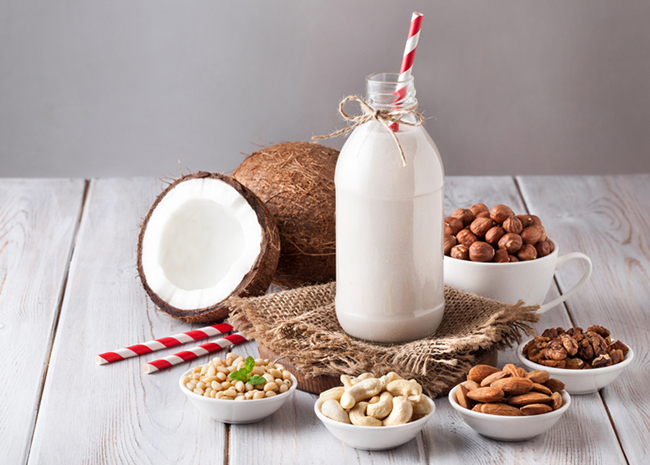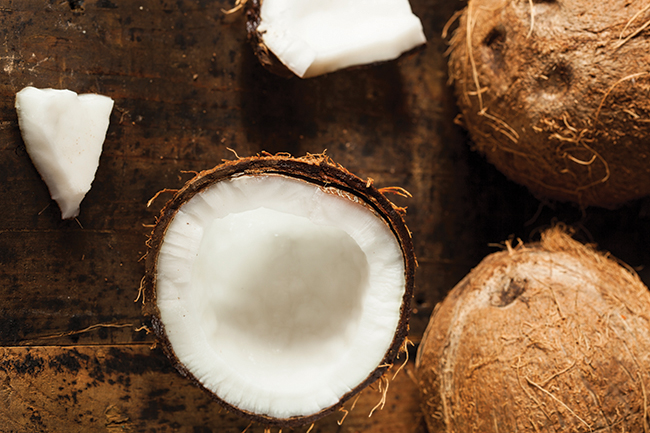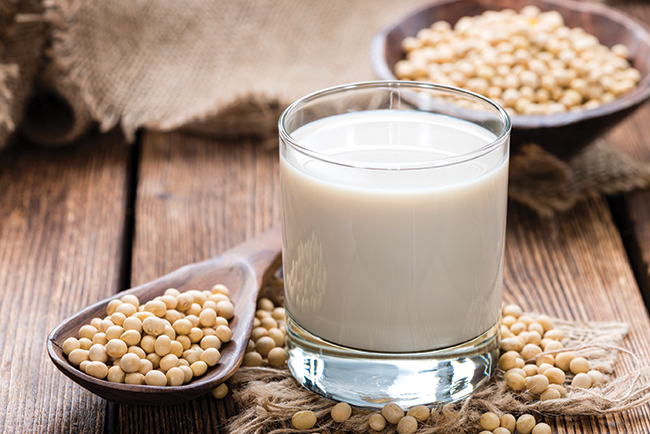Michelle Kickham examines the pros and cons of some of the more popular dairy-free ‘milks’…

Ever wondered why nearly all infants can digest real milk? And by real milk I mean the stuff containing lactose – not imaginary milk! Almost 65% of the adult human population has a reduced ability to break down lactose, the sugar found in dairy milk. The widely accepted cause of this inability to tolerate lactose is evolution and adaptation to our environments. All infants (humans, animals etc.) have evolved mechanisms to digest lactose by the production of lactase, an enzyme produced in the small intestine. As we age, we no longer need to feed from mother’s milk and so the production of lactase drops to a significantly lower level for many people. Some populations have overcome this obstacle by producing lactase throughout their adult years – though this is usually due to long-term adaptation to their cultural diets. Basically, it’s all down to your genes. Some adults ‘turn off’ the gene to produce lactase and some keep it ‘turned on’ their entire lives – that’s basically the low-down on lactose intolerance.
Though a very annoying and unpleasant intolerance to have, there are so many new options available for those avoiding dairy – whether it be for dietary reasons or ethical reasons – but you can be sure there is a ‘milk’ out there for you. Actually, these ‘milks’ are often far tastier and pack a powerful nutritional punch. I’m not vegan or lactose intolerant – but I choose to drink almond or coconut milk. Why? Their amazing flavours and nutritional profiles. Sorry cows – the nuts win here!
So, which milk is for you? It all comes down to your own taste, dietary needs and convenience. Many of these milk alternatives are available in your local grocery store, while others are strictly sold in health food stores. I’ve compiled a small list of the most popular alternatives to conventional dairy milk, along with their benefits, uses and my personal experience. If you’ve found yourself overwhelmed by the dairy-free section at the grocery store (so many milks – but which is for me?) – then this article is for you.
Almond milk
This is probably the most popular milk alternative and for good reason. With its slightly sweet, mellow flavour, almond milk serves as a perfect everyday replacement for cow’s milk. It’s packed with vitamin E (hello, healthy hair!), contains no cholesterol or saturated fat, is low in sugar and therefore a very good choice for diabetics. While you can easily make your own almond milk at home with a blender, almonds and water (yes – it’s literally that simple), store-bought brands are usually fortified with vitamin D and calcium, making them slightly more attractive nutritionally. I find that almond milk works best in baking, with cereals and smoothies and also just straight up cold from the fridge. It also makes a killer hot chocolate. My favourite brand is Almond Breeze Unsweetened.
Coconut milk
Unless you’ve been living in a cave the last few years, you’ve probably noticed that coconuts have dominated the health food industry. Though it is played up a bit, don’t be thrown by the recent ‘craze’ – it is actually incredibly good for you. In addition to its high mineral content (including phosphorous, selenium and potassium), coconut milk boasts high concentrations of medium chain saturated fatty acids (MCFAs), which are slightly different to your regular saturated fats. MCFA’s are easily utilised by the body to produce energy (basically because they’re shorter chains of fats, they can be broken down and converted to energy very quickly). One of the MCFA’s in coconut milk, Lauric Acid, is converted to monolaurin in the body which is well known for its antibacterial properties. I find that coconut milk works well in everything – from drinks to baking and cooking. It’s refreshing, quite sweet with a slight hint of coconut, but not too overpowering so that the flavour dominates. I recommend Koko coconut milk, which is fortified with calcium and vitamin D.

Hemp milk
You read it right – hemp milk. And yes, we are thinking of the same hemp plant here, but don’t fret, this milk won’t make you see flying elephants! Hemp milk is made from hemp seeds and water (as with most nut and seed milks) and contains only trace amounts of tetrahydrocannabinol – the compound responsible for its psychedelic properties – so no worries there. Containing all ten essential amino acids, 3 grams of protein per cup and a 3:1 ratio of Omega 6 and 3, this milk is perfect for vegans. It’s also packed with fibre, iron and B vitamins, again making it the absolute number one choice for vegans. Many people are a bit sceptical of this milk, associating it with plants and therefore assuming ‘it probably tastes like grass’. Actually, it’s quite sweet, nutty and one of the thicker and creamier milks out there, making it perfect for cooking, sauces and baking. This milk is so easy to make at home, requiring only hulled hemp seeds, water and a moderate blender. This milk is usually a bit pricier and is mainly sold in health food stores, so consider this when making your next weekly shopping list! (Or just make it yourself!)
Soya milk
Soya milk is a bit controversial. ‘It causes cancer’, ‘it messes with your hormones’, ‘it contains anti-nutrients!’ Relax. It’s a bean, not a cigarette. Soya milk is a wonderful dairy alternative – slightly nutty and sweet. It’s one of the creamiest milk alternatives with a protein level comparable to dairy milk. Soya milk is rich in B vitamins and as a complete protein it’s once again perfect for vegans. Many store-bought soya milks contain added oil, so watch out for that. If you’re concerned about it ‘causing cancer’ stick to organically grown soya beans. Soya contains phyto-estrogens (basically a plant-version of estrogen) and because of this it can cause some hormonal imbalances if consumed in excess. This is something I would recommend watching out for so, if you choose to consume soya milk, it’s best to monitor your moods with the amount you’re drinking and change things up where necessary. Actually, these phytoestrogens can be very beneficial to menopausal women and have been shown to regulate moods, hot flushes and breast tenderness.

Rice milk
Rice milk is probably one of my least favourite milks. It’s very suitable for those on low-fat diets and those who are allergic to nuts and soy. Rice milk contains no cholesterol or saturated fat and most store-bought varieties are fortified with vitamins B, D and calcium. It is very high in carbohydrates, making it unsuitable for diabetics. It can be very useful, however, in post-workout protein shakes, offering a quick hit of fast -acting carbohydrates to replenish muscle glycogen.
Oat milk
Similar to rice milk, oat milk is high in carbohydrates, but ranks much lower on the GI scale making it a far more attractive alternative. It’s fibre full and protein packed in addition to containing a vast array of vitamins and minerals – including vitamins B, E and A as well as manganese and phosphorous. It’s best used in smoothies and as a cereal topper. I wouldn’t recommend baking or cooking with this particular milk. It is slightly heavy and can often lend a grainy texture to some dishes. Similar to rice milk, it works well in both pre and post-workout protein shakes.
So, what milk do I choose?
I almost exclusively use Almond Breeze Unsweetened Almond Milk or Koko Coconut Milk. I find that almond milk is thicker, so this is my ‘main’ milk for baking and cooking. For smoothies and cereals, I use the coconut milk – for that tropical, refreshing taste.
 Michelle Kickham is a doctoral candidate in Immunology and Organic Chemistry and a current Irish Research Council scholar. Michelle believes that science holds the power to make a real difference and her goal is to explain the science behind health claims, offer advice and tips, as well as sharing healthy recipes to suit almost any diet.
Michelle Kickham is a doctoral candidate in Immunology and Organic Chemistry and a current Irish Research Council scholar. Michelle believes that science holds the power to make a real difference and her goal is to explain the science behind health claims, offer advice and tips, as well as sharing healthy recipes to suit almost any diet.
For more information, visit www.lifeliftsandlabcoats.wordpress.com
